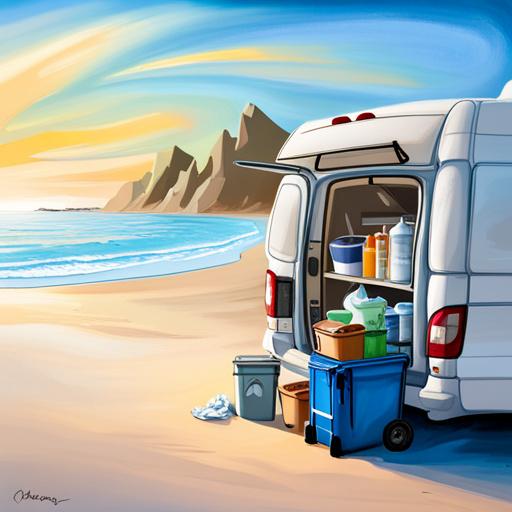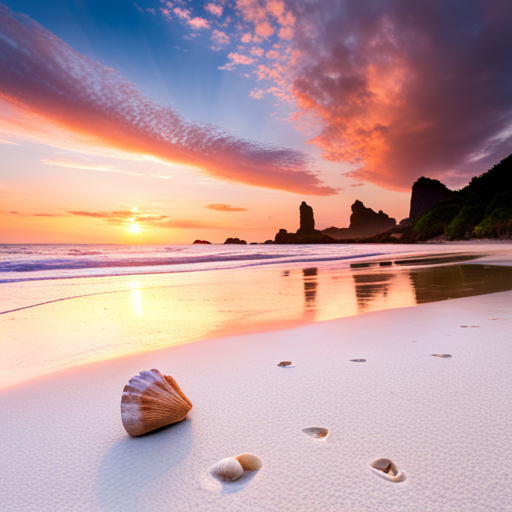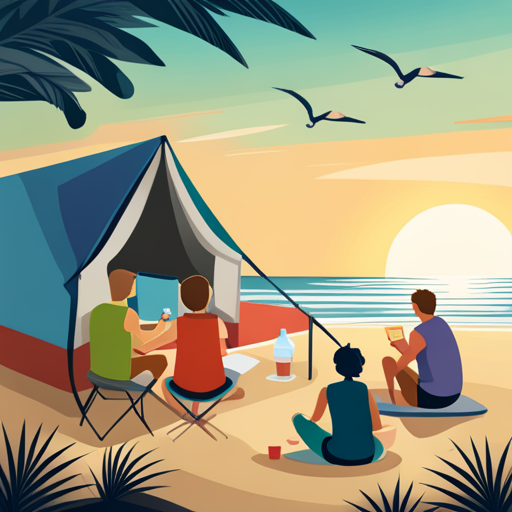Beach camping is a magical experience that combines the serenity of nature with the rhythmic lullaby of the waves. As someone who’s always loved the beach, it’s the perfect setting for an adventurous camping trip. Yet, I often wonder how to reconcile my love for beach camping with my commitment to preserving the environment. How can I ensure that my beach camping leaves no trace behind?
So, how can I camp on the beach without leaving a trace? There are 5 simple ways to ensure your beach camping experience is environmentally friendly. You can properly dispose of waste, minimize campfire impact, respect wildlife and marine life, leave what you find untouched, and be considerate of other beachgoers.
In the course of this article, I’ll delve into each of these methods in more detail. I’ll not only clarify how to implement them but also explain why they’re so crucial for preserving our beaches. So, if you’re planning a beach camping trip and want to make sure you’re doing your part to protect Mother Nature – stick around! You’re about to learn how to turn your beach camping adventure into an eco-friendly escapade.
Let’s dive in!
Key Takeaways
– Properly separate trash into recyclables and non-recyclables
– Ensure the fire is completely extinguished before leaving
– Participate in beach cleanups to prevent litter from harming marine animals
– Be mindful of noise levels to not disturb others
Proper Disposal of Waste

When camping on the beach, it’s important to properly dispose of waste to leave no trace. Sustainable practices are crucial in maintaining the beauty and integrity of the beach environment. One way to achieve this is by practicing proper waste disposal. Make sure to bring garbage bags and separate your trash into recyclables and non-recyclables. This not only helps keep the beach clean but also contributes to a more sustainable future.
Beach cleanups are another great way to ensure proper waste disposal. Participating in organized cleanups not only helps remove litter from the beach but also raises awareness about the importance of keeping our beaches clean. These events bring together like-minded individuals who share a common goal of preserving the natural beauty of the beach.
Minimizing Campfire Impact

To minimize campfire impact, it’s important to properly extinguish the fire before leaving. Here are some key steps to follow for fire safety and to comply with beach regulations:
– Ensure the fire is completely out: Use water or sand to douse the flames, making sure there are no remaining embers or hot coals. Stir the ashes to cool them down and repeat the process until everything is cold to the touch.
– Clean up the fire pit: Remove any leftover debris, such as burnt wood or trash, and properly dispose of it. Leave the area as clean as you found it.
– Respect fire restrictions: Before starting a fire, familiarize yourself with any fire regulations for the specific beach you are visiting. Some beaches may have designated fire pits or specific rules regarding campfires.
– Leave no trace: Pack out everything you brought in, including any food scraps or trash. Dispose of it properly in designated trash receptacles or take it with you when you leave. Leave the beach in its natural state, without any evidence of your campfire.
Respect Wildlife and Marine Life

Respecting wildlife and marine life is crucial for maintaining the natural balance of the beach ecosystem. When you visit the beach, it’s important to be aware of the impact you can have on the environment and take steps to protect it.
Marine conservation is an important aspect of preserving the health and biodiversity of our oceans. By being mindful of our actions, we can help ensure that future generations can continue to enjoy the beauty of the beach.
One way to show respect for wildlife and marine life is by participating in beach cleanups. These events are organized to remove litter and debris from the shoreline, preventing it from entering the ocean and harming marine animals. By volunteering your time and joining these efforts, you are directly contributing to the conservation of marine life and the preservation of the beach ecosystem.
During beach cleanups, it’s important to be thorough and meticulous. Take the time to carefully pick up any trash you find, making sure to remove all plastic bags, bottles, and other hazardous materials. Even small pieces of litter can have a detrimental impact on wildlife, as they can be mistaken for food or become entangled in marine animals.
In addition to participating in beach cleanups, it’s important to be mindful of your actions when interacting with wildlife. Keep a safe distance from marine animals, and never attempt to touch or feed them. Remember, they are wild creatures and should be respected as such. By observing them from a distance, you can appreciate their beauty and natural behavior without causing them any harm.
Respecting wildlife and marine life is not only crucial for the health of the beach ecosystem, but it also allows us to enjoy the freedom and beauty of the natural world. By participating in beach cleanups and being mindful of our actions, we can make a positive impact on marine conservation and ensure that the beach remains a sanctuary for both wildlife and humans alike.
Leave What You Find

It’s important not to take anything from the beach. When you visit the beach, it’s crucial to leave what you find to ensure the preservation of the natural environment. Here are some reasons why respecting nature and leaving what you find is essential:
– Preserve the ecosystem: Taking items from the beach disrupts the delicate balance of the ecosystem. Every shell, rock, or piece of driftwood plays a vital role in maintaining the beach’s natural state.
– Respect other visitors: Leaving what you find allows others to enjoy the beauty of the beach just as you did. By not taking anything, you’re ensuring that everyone can experience the beach in its original form.
– Promote sustainability: By leaving what you find, you’re contributing to the sustainability of the beach ecosystem. It’s a way to show your appreciation for the natural world and the freedom it provides.
– Protect future generations: When you leave what you find, you’re preserving the beach for future generations to enjoy. By respecting nature, you’re ensuring that future beachgoers will have the same opportunity to experience its beauty and freedom.
Be Considerate of Other Beachgoers

Being considerate of other beachgoers means being mindful of your noise levels and cleaning up after yourself.
When it comes to beach etiquette, it’s important to remember that everyone is looking to enjoy their time in the sun and sand. One key aspect of being considerate is controlling your noise. While it’s natural to have fun and engage in activities on the beach, it’s essential to keep the volume in check. Avoid blasting loud music or shouting excessively, as it can disrupt the peaceful atmosphere for others. Remember, not everyone shares the same taste in music or desires a party-like atmosphere on the beach.
Additionally, it’s crucial to clean up after yourself. Dispose of your trash properly in designated bins or take it with you when you leave. Leaving behind a clean and tidy beach ensures that others can enjoy their time without stumbling upon litter or debris.
Frequently Asked Questions
How Can I Effectively Dispose of Human Waste When Camping on the Beach?
When camping on the beach, it’s important to effectively dispose of human waste. Follow these beach camping hygiene tips: bury waste in a cathole at least 200 feet from water sources and campsites, or use a portable toilet system.
What Steps Can I Take to Minimize the Impact of My Campfire on the Beach Environment?
To minimize the impact of your campfire on the beach environment, make sure to keep it small and contained. Avoid burning trash or debris. Also, be mindful of how your fire’s light pollution affects the surrounding area and protect sand dunes from damage.
Are There Any Specific Guidelines on How to Interact With Wildlife and Marine Life While Camping on the Beach?
When camping on the beach, it’s important to interact with wildlife and marine life responsibly. Protect nesting areas, minimize noise pollution, practice responsible fishing, and preserve beach ecosystems to minimize your impact and leave no trace.
Is It Okay to Collect Seashells or Other Natural Items From the Beach to Take Home?
Yes, it’s okay to collect seashells or other natural items from the beach as souvenirs. However, be mindful of local regulations and only take what is abundant and unoccupied, leaving no trace behind.
How Can I Be Considerate of Other Beachgoers While Camping on the Beach?
To be considerate of other beachgoers while camping on the beach, minimize noise pollution by keeping your music and conversations at a reasonable volume. Respect designated camping areas to ensure everyone has their own space.
Conclusion
So there you have it! By following these five simple steps, you can ensure that you leave no trace when you camp on the beach.
1. Properly dispose of your waste.
2. Minimize your campfire impact.
3. Respect the wildlife and marine life.
4. Leave what you find.
5. Always be considerate of other beachgoers.
By doing so, you are not only protecting the environment, but also setting a great example for others.
So go ahead and enjoy your beach camping adventure, knowing that you are leaving nothing behind but footprints in the sand.

